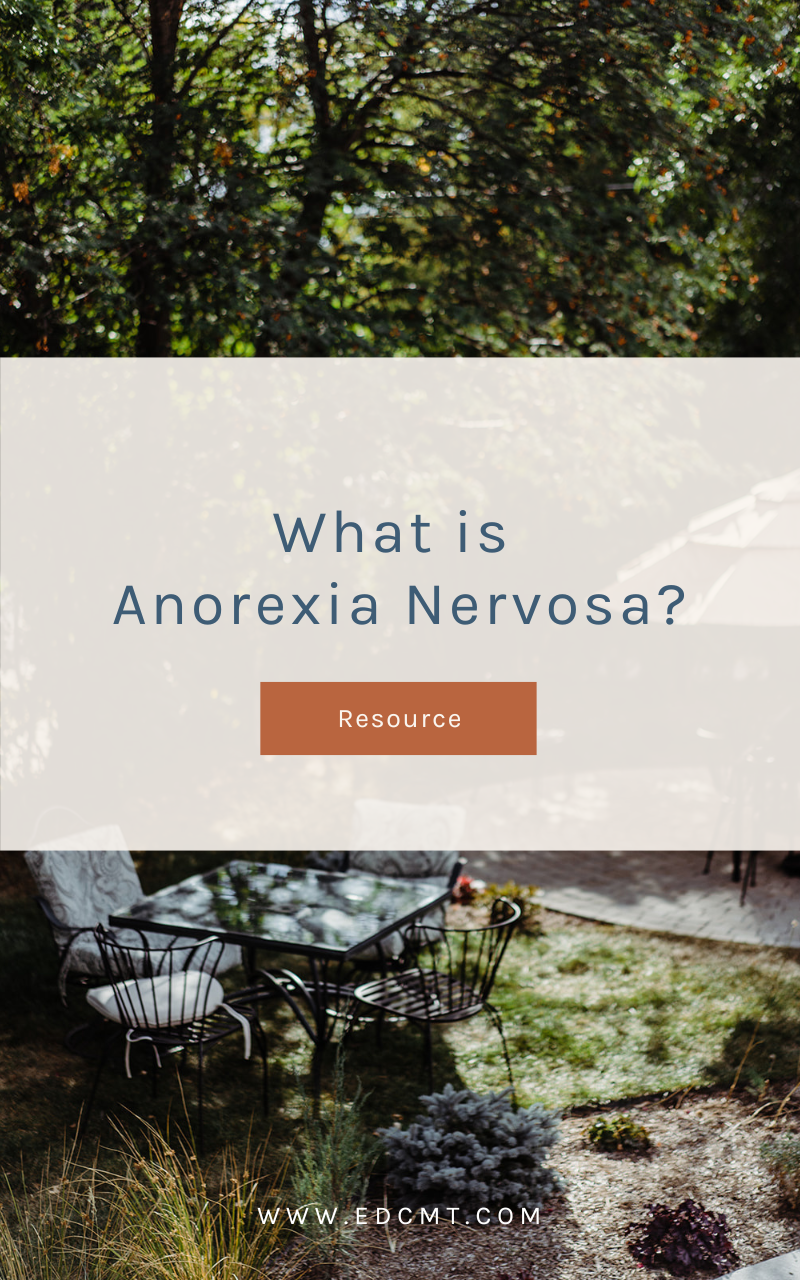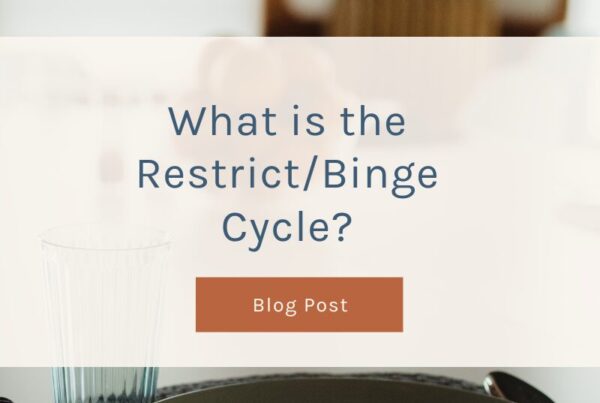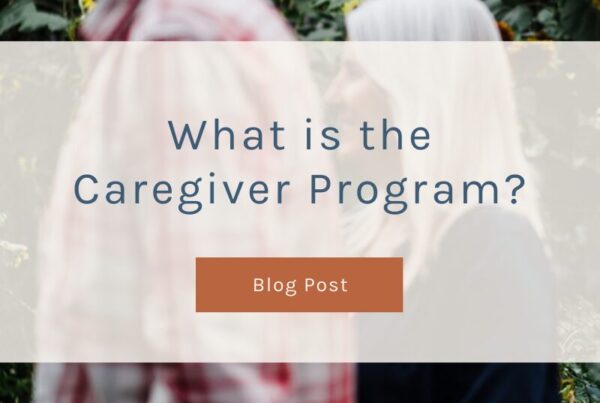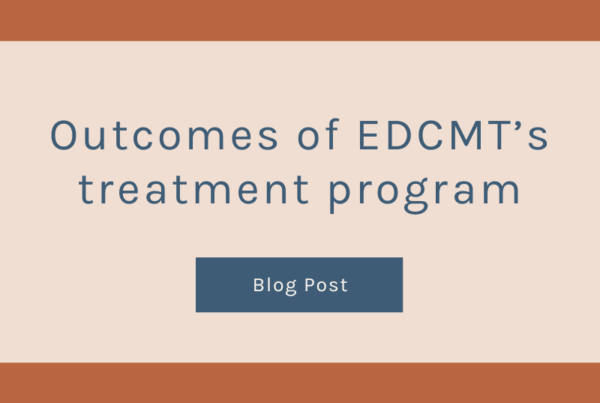
What does it mean to have Anorexia Nervosa (AN)— or Anorexia (as it is often called)? If you have Anorexia, you may have an intense fear of gaining weight. Some describe this as a constant fear of “becoming fat.” Desperate to avoid this, you may do any of the following to prevent weight gain:
- Restrict the amount or types of food you eat (dieting or fasting)
- Burn calories by exercising a lot more than most people
- Rid your body of calories quickly (purging) after eating snacks or meals. This might be done through making yourself vomit (self-induced vomiting); taking pills such as diet pills, laxatives, or diuretics; and/or compensating for eating by burning off calories through exercising.
You might view your body shape or size differently than others. You might feel you are overweight, or at risk of becoming overweight, when other people tell you that you are normal weight or underweight. You may also be taking part in these behaviors, but be at a normal or heavier weight, which is known as Atypical Anorexia. You may also take part in these behaviors along with having a fear of “unhealthy” or “impure” foods, which could be Orthorexia.
You’re not alone. Like all eating disorders, Anorexia can affect people of all ages, genders, races, and ethnicities. While many studies have focused on young girls, all genders can be affected, including men. “At any given point in time between 0.3%-0.4% of young women and 0.1% of young men will suffer from anorexia nervosa.” (Keski-Rahkonen A, Hoek HW, Susser ES, Linna MS, Sihvola E, Raevuori A, …, and Rissanen A. (2007). Epidemiology and course of anorexia nervosa in the community. American Journal of Psychiatry, 164(8):1259-65. doi: 10.1176/appi. ajp.2007.06081388.)
Some warning signs of Anorexia Nervosa may include:
- Dressing in layers to hide weight loss or stay warm
- Preoccupation with weight, food, calories, fat grams, and dieting
- Denial of feeling hungry
- Consistently making excuses to avoid mealtimes or situations involving food
- Expressing a need to “burn off” calories taken in
- Having a strong need for control
- Menstrual irregularities—amenorrhea, irregular periods or only having a period while on hormonal contraceptives (this is not considered a “true” period)
- Stomach cramps and other non-specific gastrointestinal complaints (constipation, acid reflux, etc.)
- Difficulties concentrating
- Feeling cold all the time
And more.
In the most recent Diagnostic and Statistical Manual of Mental Disorders (DSM-5)—the manual used by mental health professionals and insurance companies to diagnose patients—some changes were made to the diagnosis of Anorexia Nervosa. The new version no longer lists amenorrhea (loss of menses) as a diagnostic criterion and focuses more on behavior than body size. This is notable because it gives more room for the therapist to use their best judgment about how a patient’s behaviors are affecting their life, and also leaves more room for men to be formally diagnosed as Anorexic.
According to the National Eating Disorders Association (NEDA), the health consequences of Anorexia Nervosa can be serious and life-threatening:
“In Anorexia Nervosa’s cycle of self-starvation, the body is denied the essential nutrients it needs to function normally. Thus, the body is forced to slow down all of its processes to conserve energy, resulting in serious medical consequences. The body is generally resilient at coping with the stress of eating disordered behaviors, and laboratory tests can generally appear perfect even as someone is at high risk of death. Electrolyte imbalances can kill without warning; so can cardiac arrest. Therefore, it’s incredibly important to understand the many ways that eating disorders affect the body.”
Anorexia has the second highest mortality rate of all mental illnesses.
And, it’s important to remember that recovery from Anorexia Nervosa is possible. The sooner someone seeks treatment, the easier recovery can be, and the higher the possibility of having a long and healthy recovery. The journey might take some time, and a dedicated effort needs to be made to eat and move in ways that are sustainable to fuel the body for day-to-day activities. The emotional work is similarly an effort; a collaborative one between patient and therapist, patient and family and the larger community. This is the work it takes to observe the patterns of the behaviors and gain trust back in oneself and others. It also takes time to rely on self-awareness and instincts, intuition, and creativity that hide beneath the deprivation, so that relationships can be built or rebuilt and self-knowing can replace control and fear.
Treatment at EDCMT begins with exploring all the ways your eating disorder affects you. Our designated intake team – which always includes a therapist and registered dietitian – will meet with you to better understand your symptoms and then make a recommendation on which treatment program will be most effective for you. During your initial meeting with our intake team, we will schedule a follow-up conversation to discuss your goals, plans, and answer any questions you may have about our treatment recommendations.
Every patient at EDCMT has a dedicated treatment team consisting of a therapist and registered dietitian. Patients meet with their team individually, in addition to group therapy and meal support, if necessary. Your registered dietitian will work with you to create a meal plan and shopping list, and your therapist will work through behaviors, helping to identify triggers and create healthier coping mechanisms.
As with all eating disorders, Anorexia is not a choice and no one is to blame.
If these symptoms feel familiar to you, you deserve help and support.
Even if you don’t feel sick enough, you still deserve help.




